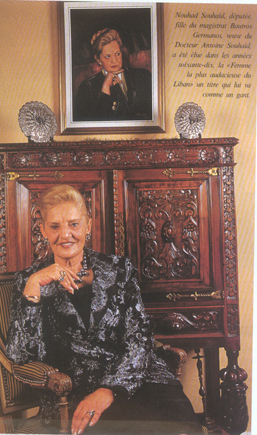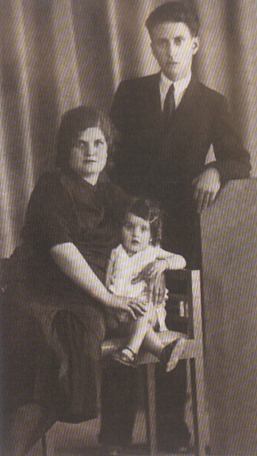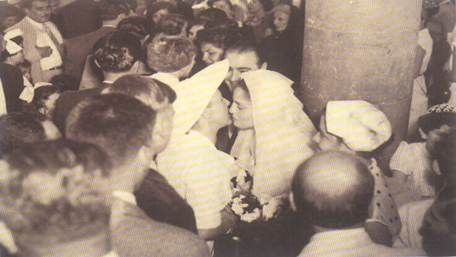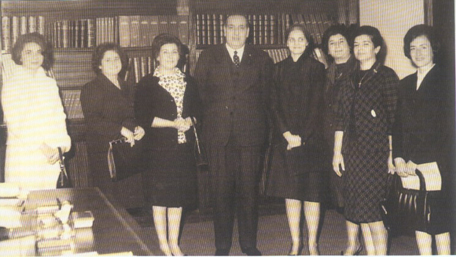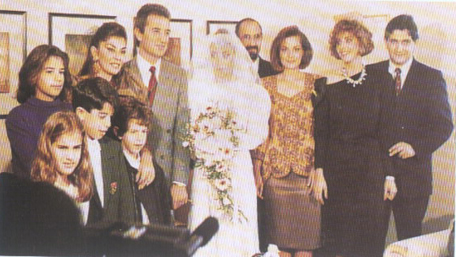Very strong, very woman, Nouhad Souhaid surprises by an undeniable presence, the energetic gesture, a subtle humor perfectly balanced. While belonging to the world of «old politics», she remains a symbolic figure inseparable from the current Lebanese democratic life. As a Grandmother, she doesn’t consider herself as a model for others, but with modern opinions, much more than an «MP who entered Parliament in a black dress» as tradition prescribes, Nouhad Souhaid is rightly a representative of this proud people, stubborn and brave, of her fief Qartaba in jurd Jbeil. Determined, she begins her fight in 1965, and enters the Parliament through the big door in 1996. Meeting at home with the past, present, honesty and emotion.
© Prestige / Bassam Lahoud
Nouhad Souhaid MP, daughter of magistrate Boutros Germanos, widow of Dr. Antoine Souhaid, was elected in the 70s, the «most courageous woman of Lebanon», a title that fits her like a glove.You have studied at the school of the Sisters of Besançon and the law at USJ, at a time when few girls completed their higher education. How is that? Because I liked it, plus I succeeded at High school in the Philosophy section. My parents, especially my father, judge and lawyer, encouraged me to study law. I belonged to a generation of girls who were open to the active life regardless of marriage and began to mingle with the public life. We were a group of young people at the time of Jean-Paul Sartre and Juliette Greco. There were among others Souad, sister of Minister BahigeTabbara, Dr. Joseph Sayegh, Bassem Jisr, Alia Solh…At some point in my life, I looked around me and saw that my former comrades made the country: doctors, judges, MPs, bankers, while little girls in bathing suits, frequented beaches, I often went to the Military pool. My parents were very open-minded, they trusted me which gave me some self-confidence. They were disappointed not to see me finish my law studies. My father was not at all happy that I married. I am different from my sisters. One, focused on humanitarian, became a graduated nurse at the Red Cross. My other sister Nahla attracted by the fashion world, lives and works in Paris at Maison Pierre Cardin.
It seems you had, a lot of success with boys at school and the university. Do you know why we had success? Whatever their degree of beauty, four girls with four hundred boys will definitely attract attention! To give you an example, I learned that the Minister Joseph Chaoul was my university classmate the day, when he became minister, he said:”You do not remark our presence, no more today than in the past!”Our generation was successful, because we were studious. I remember members of parliament Abdellatif Zein, Kamel Assaad, magistrates Amine Nassar and Maurice Khawam and Sheikh Selim Khoury who took us for a drive in his car,a luxury at the time, and we went throughout Lebanon. At the time, we made no distinction between Christians and Muslims.
But we had to ask about the “name”, our parents were firm on these two points: good family and unimpeachable reputation. I was very close to the girls of Riad Solh, we invented a thousand pretexts to go out. We played Souk ukase, “the market of Arabic poetry” as we were all French educated, it was for us an exciting jousting to provoke each others with blows of rhymes. Melhem Karam was invincible. This was the generation of the post-Independence, our parents had worked for the liberation of the country and believed in hard. There was then a true national agreement.
© Archives Nouhad Souhaid
Nouhad Souheid, child, with her parents Boutros and Adele Germanos from Akoura.How did a law student meet a doctor? I have not met my husband at university. We are native of the same region, I am from Akoura, his father Fares Souhaid a respectable doctor from Qartaba. My family spent summer in Mejdel Akoura, and I greeted the young doctor during his visits. He became surgeon at the Hospital of Habib Khoury Saade, father of May Arida, and went on his mission of a village doctor and cared for the farmers in the area. As clinics were non-existent at the time, anyone who had an unrest, a health problem came home to wait for the doctor. Our home was open to all.
One day, while I was back at home where we had gathered people seriously injured, I asked the doctor how were the patients? “At the best of their shape.”
I said to my mother: “How arrogant is this young doctor, does he believe he can resurrect them?” And indeed they healed. It is his generosity of heart that seduced me. I was worldly, he was very serious, but close to the people and charismatic. I wanted to build my life with him. We loved each other “with reason”, have built the house, then the hospital and walked slowly into the political arena. I was at the same time his companion, his friend and his wife.
© Archives Nouhad Souhaid
The day of her marriage with Dr. Antoine Souhaid.Who had the idea to stand for election? My husband did not think about it, his father was not into politics but he was a chieftain, the Souhaid are a large family scattered in Keserwan and Jbeil and his house was open to all, he supported politically Ahmed Husseini and when he asked his family to vote for him, everyone followed his recommendations. During the revolt of 1958, my husband opened the doors of his hospital for the wounded. And when Zgharta lived the black period of vendettas, he stayed two days, no doctor had agreed to come rescue the injured. He treated the wounded from all sides, families were arranged by floors, the third reserved for Doueihy, the second to Mouawad and the first to Frangieh. Finally, my husband was doing in Jbeil and Beirut an average of twelve interventions per week. In 1964, he formed an electoral list with Ali Husseini and Dr Chahid Khoury, who were opposed to Raymond Edde. He was elected and remained one year. On May 15th, 1965, he was struck by a heart attack while he was about to be appointed Minister of Health.
Fouad Chehab stunned: «What? A woman! To stand up against Raymond Edde?»
Are you superstitious? Yes, although some may find it ridiculous. My husband was the only son among five sisters. An envious visitor once said to my father in law, filled with happiness by the birth of his second grandson: “You have male heirs, you have a son MP, soon minister! What do you want more? You’ve got luck!”That same year, my husband died. Yes, I fear the eye of the envious.
You took after your husband in politics just after his death. Were you ready? People knew me, since I had prepared his campaign in 1964.People even accused me of having “encouraged” him to do politics. It is true that I have always loved this domain. The death of my husband left me a widow with six children and a lot of debts. Family and companions of my husband and his supporters of the Jbeil League, among them Louis Kordahi and Dr. Merheb asked me to present myself in the elections. At first I did not quite assimilate what I was asked to do. I was still shocked by his death. Then the idea has gained ground.
It is only now that I realize how much I was strong then. I thought it was easy. There was already a precedent, after the death of Emile Bustány, Kamal Jumblatt has left the way open to his daughter Myrna, who sat in Parliament. Kamal Jumblatt asked the same from Raymond Edde not to oppose to my application so that I continue the mandate of my husband. Edde did not hear it that way, his supporters either. Some even believe to this day that if my husband was successful, it is thanks to the Second Bureau who made then rain or shine. I don’t deny that we have always been chéhabists, General Fouad Chehab himself had great respect for my husband, he has always watched over us, even after the death of my husband. It is true that we also had friendships with Second Bureau, but I affirm and reaffirm that if Dr. Antoine Souhaid was elected is because he deserved to be a member!
What troubles me most, is that his election was considered in a dirty way. Raymond Edde, gentleman, was appreciated in the circles of Beirut society, rather than Dr. Souhaid, native of Qartaba. But again, Dr. Souhaid deserved to become an MP, and I wanted to continue the fight, because I was touched to the heart by these calumnies almost as much as by his death. You cannot know how he had been wounded by these attacks. Proof of what I say is that thirty-five years after his death, people voted for «the wife of Dr. Antoine Souhaid.»
© Archives Nouhad Souhaid
Still dressed in mourning, at the head of a delegation of women from Jbeil, Nouhad Souhaid visits the President Charles Helou.How could you resist so long? Because I have thick skin! (laughs) In 1968, I lost against Raymond Edde with a difference of just 800 votes. Not to mention that President Charles Helou himself was against me and also Takieddine Solh. There was no “mediator”. All liberalists came to support Raymond Edde in Jbeil, and chéhabists bring reinforcement to Nouhad Souhaid. And it was almost as if Raymond Edde and Nouhad Souhaid no longer existed. Only counted these two political trends, the daily An Nahar opened war against me. I have a lot of consideration for Raymond Edde, excellent parliamentarian, but some of the inhabitants of Byblos think that he wears a smoking but he is barefoot. From Beirut, he has no deep strains in Jbeil, although having some friendships…
But I am not a candidate just to score points. A certain political trend adopted me because the supporters realized that I had the necessary potential. At the time, there was a definite political line, opponents, allies, it was either white or black, there were no half measures! My political action was not limited to duels against Edde. I mobilized myself in Jbeil and across Lebanon for more useful causes. Friends with Kamal Jumblatt and Jamil Lahoud and politically to the left of Chehabism, vice president of pmi Destour, I was working for social justice. It was my own choice. My activities went beyond the caza of Jbeil to include the entire nation. I made several times speeches in Tripoli, Mokhtara… I was not just obsessed with the elections and the way to defeat my opponents…In 1970, the revolt was brewing in the students community. It was also the golden age of public schools. I saw young people revise in the light of the streetlamps. I was sympathetic to leftist parties, I got scholarships for young people in my area. I belonged to this political class who foresaw the turmoil, through the excitement of intellectuals. I thought the revolt would trigger from the base of the pyramid to the top. I learned with bitterness that it was the summit that would attack the base, that the people would be the victim.
Weren’t you dissuaded to run for elections? Oh yeah! Patriarch Meouchy at first, he called me, told me to go home and just raise my children.
«… We will pay off your debts.» I told him that I was presenting on behalf of someone who had devoted himself to others and that I had nothing to sell, but I had supporters…which were not for sale.
How this mountain region accepted a woman running for election? Seventeen communities coexist in the region of Jbeil. In 1965, all voted for me as a «widow» of Antoine Souhaid. It is rather the worldly class that has not accepted me. May be because my rival was named Raymond Edde, who was, incidentally, very loved by women.
In the offices of Shiite votes, my score was impressive, men related to my opponents then went into the villages to try to dissuade them: “How you, Shiites, do you agree that a woman directs you” they were answered by quoting the Quran: “the mother of the orphan, do not vex.”
Even today, in 2000, very few women sit in Parliament, why women do not involve more actively in the political life in Lebanon? Let’s face it, our women MPs enter Parliament in black dress, dressed in mourning. If my husband had not died, I would have appeared on the political scene, but on his side. However, I have a merit, having persevered despite political, financial barriers. That is my strength. Women are accepted in Parliament, and anyway, Nayla Mouawad, Bahia Hariri and myself, we do not let it go. One of the obstacles to women’s active participation in political life, it is not that it is accepted or not, it is the absence of the parties. It was desirable after the war, that nationalist parties reappear to counter the rise of sectarianism. Women cannot succeed alone without the support of a party, even if she is very active, and surrounded by many supporters. In the presence of a confessional structure, it takes a lot of money, a lot of effort…
Have you appointed a political heir among your children? All my children were my electoral locomotive, each in its field. I have not spent a lot of time with them but I taught them a basic lesson is respect for freedom. Each has chosen its own way, made its own choice. And I hope that in 2000, my son Fares, MD, will run the election and take over my place, his political speech is remarkable. He is active, very human, very close to the people.
© Archives Nouhad Souhaid
At the wedding of her youngest daughter Adeline: Marie-Claude, the eldest, Maya, Nada and their children.Your political career is littered with moments of emotion. Which do you have in mind? In 1996, the election results were made to wait until late in the afternoon. Victorious, I went out of the Seraglio, thousands of people after me, and an escort of 200 to 300 cars. But the vision that moved me most, beyond the festivities, it was on the place of Fatré around the statue erected to the memory of my husband, thousands of candles lit by supporters. As if they wanted to tell their doctor, that they held promise and finally were able to realize his wish. People still remember the day of the funeral of Dr. Antoine Souhaid the convoy left Beirut in the morning and did not arrive until the evening to Qartaba, because the body was carried by friends of my husband!
The muezzin of Almat and Muslim villages were reciting the prayer for the dead, the peasants had raised the green flag of mourning reserved for their dignitaries. And bells of Christian villages where the convoy was passing, sounded the death knell. My husband was really a very loved man. Even General Fouad Chehab was very affected by his sudden death and although reluctant to replace him by a woman candidate, young moreover, he finally accepted.
Your vision of politics in 2000?
There is no more improvisation in politics, one must be surrounded by a team of advisers.
I work alone… the old way! Interview by Marcelle Nadim


